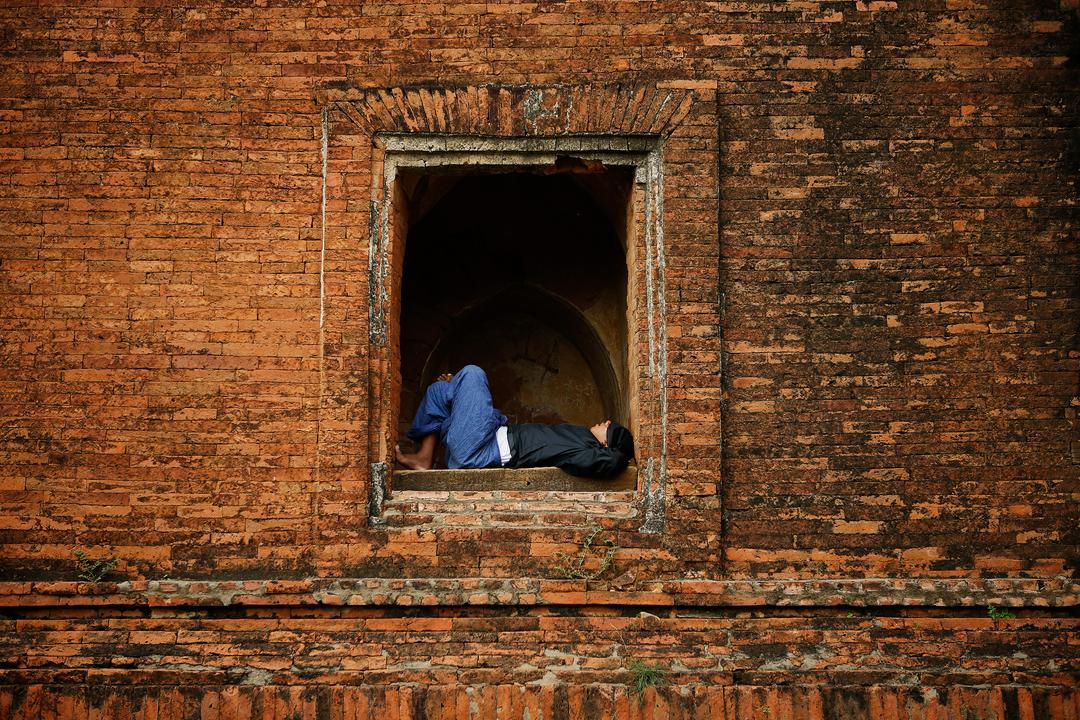Welcome to DU!
The truly grassroots left-of-center political community where regular people, not algorithms, drive the discussions and set the standards.
Join the community:
Create a free account
Support DU (and get rid of ads!):
Become a Star Member
Latest Breaking News
Editorials & Other Articles
General Discussion
The DU Lounge
All Forums
Issue Forums
Culture Forums
Alliance Forums
Region Forums
Support Forums
Help & Search
The DU Lounge
Related: Culture Forums, Support ForumsWhat sleep is and why it exists
Last edited Tue Oct 14, 2025, 01:41 PM - Edit history (1)

What sleep is
It is our biggest blind spot, a bizarre experience that befalls us every day, and can’t be explained by our need for rest
https://aeon.co/essays/two-billion-humans-are-doing-something-bizarre-right-now-sleeping

Dhammayangyi Buddhist temple in the ancient city of Bagan, Myanmar, 2013. Photo by Damir Šagolj/Reuters

After decades of research, there is still no clearly articulated scientific consensus on what sleep is or why it exists. Yet whenever sleep comes up as a topic of discussion, it is quickly reduced to its necessity and importance. Popular media remind us of what can, and will, go wrong if we do not sleep enough, and serve up some handy tips on how to overcome insomnia. Discussed exclusively in utilitarian terms, we are force-fed the idea that sleep exists solely for our immediate benefit. Is this really all we ever want to know about a third of our existence? Sleep is perhaps the biggest blind spot, or the longest blind stretch, if you will, of our life. Naturally, the health and societal implications of sleep are huge: from technogenic disasters caused by tiredness, to sleep deprivation as a form of torture or weapon of war, and to sleep disorders, some of which inflict so much suffering that they compete with chronic pain. However, in my opinion, to say sleep is important is to miss the point entirely. Sleep is the single most bizarre experience that happens to all of us, against our will, every day.
The disconnect between old questions about sleep that have remained open for centuries and new, increasingly sophisticated technologies applied to solve them is ever growing. The predominant view is that sleep provides some sort of restoration for the brain or the body: what goes awry – out of balance – in waking is almost magically recalibrated by sleep. At the centre of this narrative is the individual-who-sleeps, a lone castaway, locked in a permanent, inexorable cycle of sleeping and waking, without hope of breaking free (except in death). From the moment of opening one’s eyes, the clock starts ticking, and there is a price to pay for every minute of wakeful time, measured precisely in proportion to the transgression of staying awake. Like a snake eating its own tail, waking and sleep consume each other in an endless cycle, without beginning or end. There is no mercy, and lack of sleep can be paid back only by sleep. The image of burning a candle at both ends endures.
Despite vast technological advances in recent years, exponential growth in our understanding of nature and the cosmos, and major breakthroughs in biology and medicine, there is still no unified theory of sleep. I find myself pondering whether it is time to step back and seek a different angle.

Illustration from a manuscript of The Decameron by Giovanni Boccaccio, translated by Laurent de Premierfait, circa the 15th century. Courtesy the BnF, Paris
I propose taking an alien perspective on sleep. Imagine our planet Earth from space, and try to picture all the organisms inhabiting it these days – plants, fungi, bacteria, insects, mammals, birds, fish – a sphere teeming with life. If you wanted to have some sort of measurement of all this biological activity – think of these creatures running, swimming, flying, building nests or digging burrows, migrating, hunting, eating, drinking, mating, caring for the young, even playing. Earth behaving in countless ways, nature in action, existence through movement, at different spatial and temporal scales. Trophic chains and multilayered networks of organisms interacting, exchanging energy, matter and information, co-existing and co-evolving. Strikingly, the last thing in this picture that would come to mind – if at all – is sleep. Let’s try to overcome this and, in your mind’s eye, make sleep visible – revealed as a sort of negative image of activity, where action is hidden and stillness is all you can see. A new view will emerge, one that is just as rich and dynamic. We live on a half-asleep planet where, speaking of our species alone, at any given time close to 2 billion people may be asleep.
snip
3 replies
 = new reply since forum marked as read
Highlight:
NoneDon't highlight anything
5 newestHighlight 5 most recent replies
= new reply since forum marked as read
Highlight:
NoneDon't highlight anything
5 newestHighlight 5 most recent replies
What sleep is and why it exists (Original Post)
Celerity
Tuesday
OP
Before reading even the excerpt, I say it is for clearing out & repairing the brain. I look forward to reading later. nt
Bernardo de La Paz
Tuesday
#1
Bernardo de La Paz
(59,632 posts)1. Before reading even the excerpt, I say it is for clearing out & repairing the brain. I look forward to reading later. nt
Alice Kramden
(2,810 posts)2. Thought-provoking K&R
Sleep is there not simply for recovery or rest, but could be, in fact, our default state of being
Bookmarked - thanks for posting
darkstar
(5,723 posts)3. Thanks for this!
Super interesting lunch time reading.